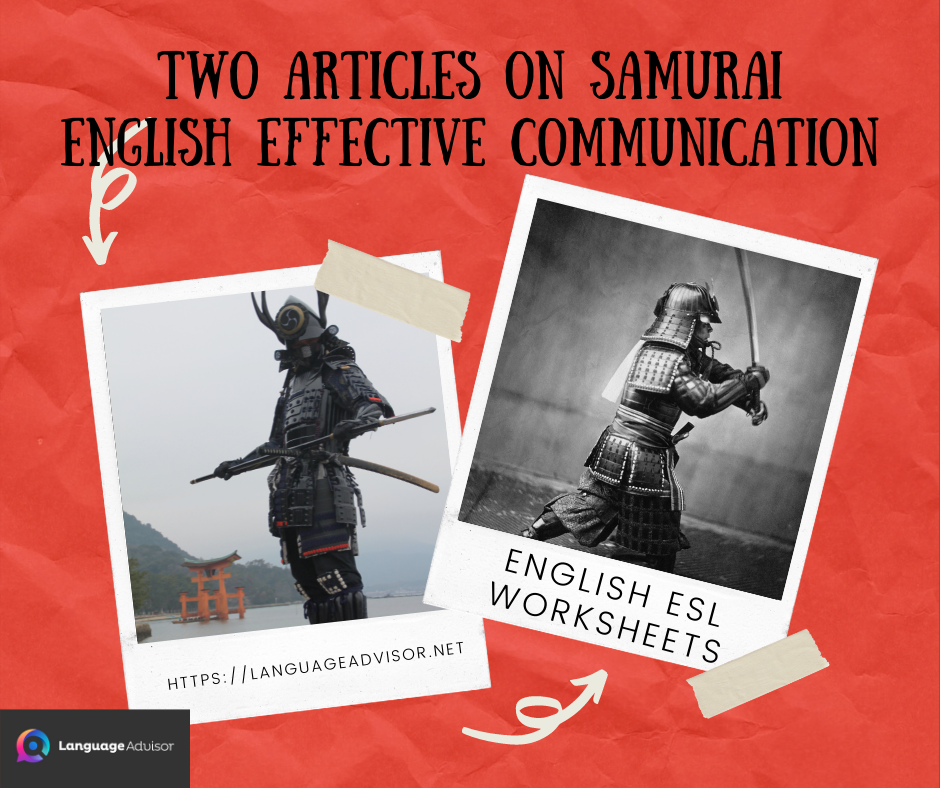Two Articles on Samurai – English Effective Communication. English ESL Worksheets to improve reading and develop strong language and Speaking skills.
Two Articles on Samurai – English Effective Communication

Two Articles on Samurai – English Effective Communication
Procedure
Divide the class into pairs. Give each student a copy of either the A or B reading sheets. The students read the short articles silently by themselves and use a dictionary or consult the teacher if they don’t understand a word or phrase. After the students have read and understood the articles, the teacher takes the articles away. Then student A will communicate what was in A’s article to student B, and student B will communicate what was in B’s article to A. Then all of the students take a test to see how much information they were able to communicate.
| Bushido: The Way of the Warrior The samurai were a class of warriors in Japan before modern times. They lived according to ‘the way of the warrior’ called bushido. Bushido requires samurai to be honest, courageous, virtuous, frugal, and disciplined. On of the most important qualities was courage. One samurai warrior wrote that if you go to battle determined to die, you will survive. But if you hope to survive a battle, you will surely die. Samurai had no fear of death. They considered it an honor to die in battle. If they lost the battle, they would kill themselves in a ritual called seppuku. In the siege of Tottori castle in 1581, the defenders were surrounded for over 200 days. They had run out of food, eaten their horses, and were forced to eat grass. The siege ended when the castle’s master, Tsuneie, agreed to commit suicide in exchange for food for the people in the castle. Samurai usually preferred to fight one on one. In battle, a samurai would try to find a ‘worthy’ opponent. The samurai would call out his family name, rank and deeds. Then, he would seek out an opponent with similar rank and do battle. When the samurai had killed his opponent he would sever his head. After the battle, he would take the head of his enemy back as proof of his victory. | The Last Days of the Samurai Traditionally, the samurai had a special position in society. There was a belief that only people born of samurai blood could fight well. They trained in martial arts their whole lives. They were not allowed to engage in other professions such as farming. For their service, they were given special privileges. However, the imperial government in Japan decided to modernize the country by building railroads, industry and a modern army. After modernization began, the government no longer needed the samurai. Some samurai joined in the industrialization of Japan. They became captains of business and officers in the new army. But most of the samurai were left out of modernization and their rights and privileges were taken away. In 1873, the samurai were forced to serve in the modern army with common people. This was considered a dishonor to them. By 1876, they were no longer paid any salary and they were forbidden from wearing their swords. The shame was unbearable. And so, in 1877, the great Satsuma rebellion occurred. However, the samurai were defeated by a modern army of commoners, which destroyed the belief that only samurai could fight well. | ||
| (1) What is the title of the article? (2) Who were the samurai? (3) What is bushido? (4) What did bushido require samurai to be? (6) What was one important quality of being a samurai? (7) What did one samurai write? (8) What did the samurai have no fear of? (9) What would they do if they lost a battle? (10) When was the siege of Tottori castle? (11) How long were they surrounded for? (12) What problem did the defenders have? (13) How did the siege end? (14) How did the samurai prefer to fight? (15) What would they do in battle? (16) What would they do when they killed an opponent? (17) What did they do with the head after the battle? | (1) What is the title of the article? (2) What was the belief about samurai? (3) How long did the samurai train in martial arts? (4) What were the samurai not allowed to do? (5) What were the samurai given for their service? (6) What did the government of Japan decide to do? (8) How did the government decide to modernize Japan? (9) How did some samurai benefit from industrialization?(a)(b)(10) What happened to most of the samurai? (11) What happened in 1873? (12) How did the samurai feel about serving in the modern army? (13) What two bad things happened to the samurai in 1876? (14) What happened in 1877? (15) Who defeated the samurai? (16) Why was their defeat important? |

All downloads are in PDF format





